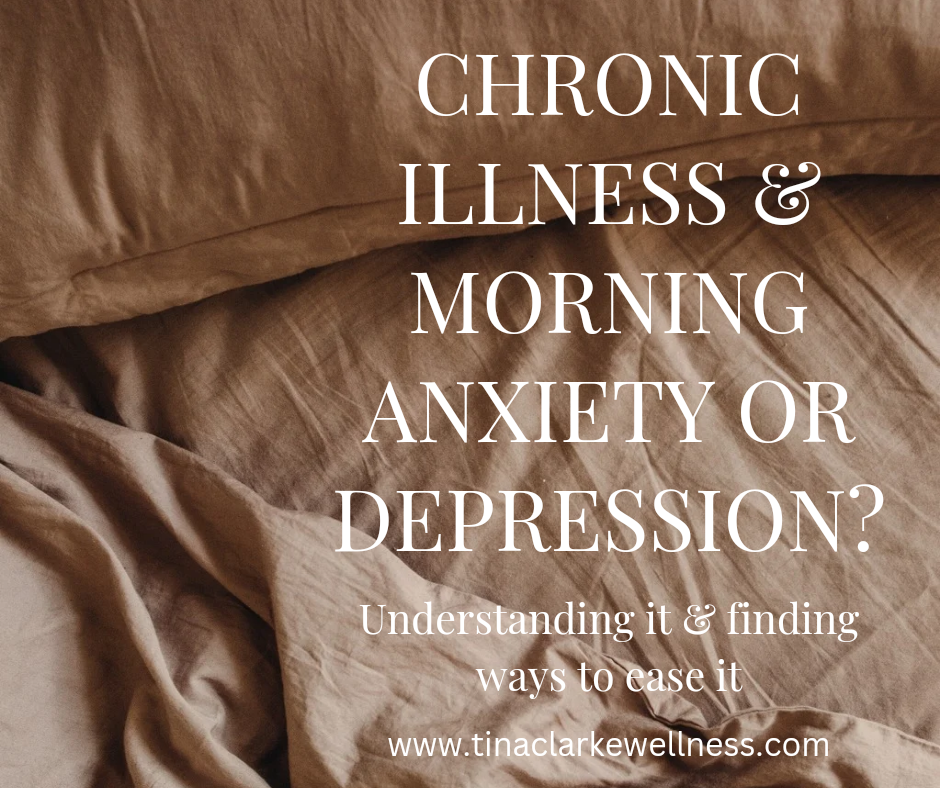
22 May Chronic illness and waking anxious or down?
Do you wake up and immediately feel anxious with racing thoughts, or your awareness goes directly to your body symptoms and the associated discomfort or concern? Or maybe you are someone who opens their eyes only to feel a slight sense of dread or lowness of mood, making you not want to get up and face your day. All of these morning states are common in those of us living with health issues, and of course it isn’t your fault and is really unpleasant. If our first emotions in our day are ‘negative’, we can spend the rest of the morning or day trying to get to a reasonable emotional baseline, which impacts our quality of life.

In the morning there is a natural and healthy increase in our body of the hormone cortisol, that helps create healthy activation in us and is also known one of the stress hormones, which assists us physically and emotionally to get out of sleep and begin our day. Sometimes our level of cortisol can be dysregulated, meaning that due to childhood trauma, chronic stress or anxiety, chronic medical trauma, etc, we may have too much or too little cortisol, which in turn affects our nervous system responses and our emotions. The dysregulation of cortisol can be a cause of waking anxious or depressed.
Sometimes chronic illness can also be associated with dysregulated cortisol levels, including diabetes, cardiovascular disease, rheumatoid arthritis and lupus. Research seems to show that many of the chronic illnesses are deeply correlated with nervous system disruption, and cortisol as a stress hormone is part of our nervous system.
We can also experience these mood changes simply due to having to face the unpredictability, pain, financial disadvantages and disruption of living with health issues in amongst the other aspects of our life.

Knowing the potential causes of your altered mood in the morning is empowering and also knowing that there are gentle ways we can help reduce the intensity of those emotions. Somatic practices alone won’t necessarily change your cortisol level if there is deep seated trauma still held within you, but our nervous system (and our emotions), is “plastic”, which means it is capable of change. Our nervous system changes with trauma, stress and other factors and it is shown that it can also come back into healthy functionality over time, through nervous system regulating practices, like somatics (bodymind based exercises), gentle movement , social/emotional connection and more.
Somatic practices and explorations will involve increasing awareness of your own nervous system state in real time and gently attending to those states. For example, if we wake in the morning with anxious, jittery energy, it means we are too activated and in what we call the Sympathetic (fight or flight) state. This could be attended to with helping discharge that anxious energy with some shaking, or maybe slowly lengthening our exhale to gently bring us more into a relaxed, calmer state, what we call the Parasympathetic part of our nervous system (rest & digest).
If however we wake sad, low, depressed, our system is so overwhelmed that we are dropping into immobilisation, disconnection and we could explore softly bringing a little more activation into our system with for example, gradually deepening the breath, focusing on the stimulation of our inhalation, and maybe some gentle expansive movement.
Somatic practices are one of the very few approaches that acknowledges that our nervous system and physiology is deeply intertwined with our emotions and mental health, and this “bottom up” way of working with emotional/mental wellness is effective, and the more it is practiced, the more differences will be felt.
CLICK ON THE IMAGE BELOW TO SIGN UP TO MY FREE RESOURCES PAGE WHERE YOU WILL FIND MY FREE GUIDED VIDEO ON STARTING YOUR MORNING “EMBODIED” & FOR REGULATING YOUR NERVOUS SYSTEM TO AWAKEN IN A SOFTER WAY





Sorry, the comment form is closed at this time.